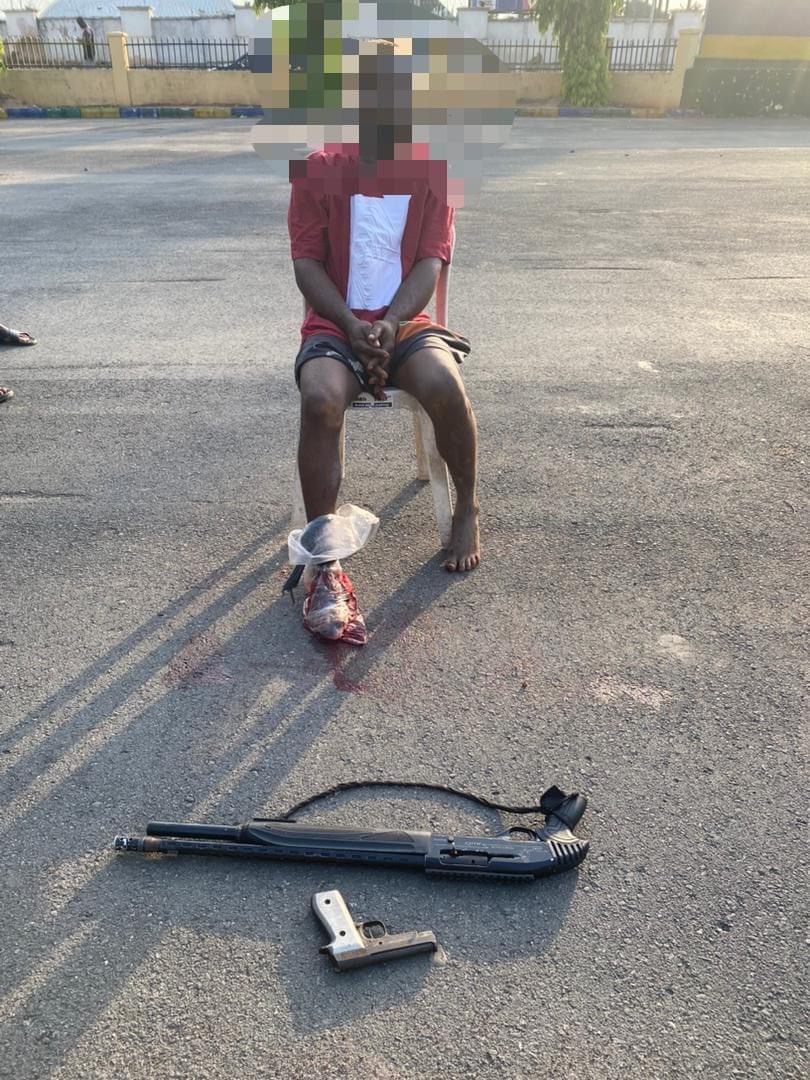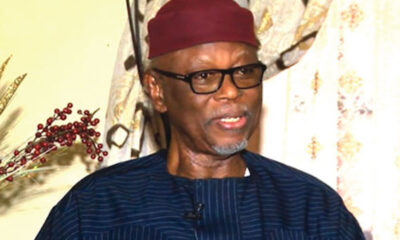Trending
One among Suspected K!llers of DPO Ahaizu Mbaise and an Inspector of Police in November 2023. have been Apprehended by the Imo State Police Command.

IMO STATE POLICE COMMAND PRESS RELEASE OF MONDAY, 8TH APRIL, 2024.
INTERNAL SECURITY: POLICE ARREST SUSPECTED IPOB/ESN TERRORIST IN IMO, RECOVER ARMS AND AMMUNITION
The Command will not relent in its unwavering commitment to clamp down on criminally minded elements in the State ~~~~~ says CP Danjuma
The Imo State Police Command has on Monday, 8th April 2024, recorded another significant breakthrough in fight against IPOB/ESN terrorism activities in State following a diligently gathered actionable intelligence by Operatives of the Command’s Anti-Kidnapping Unit which led to the arrest of a suspected IPOB/ESN Terrorist, Chidebere Nwuzor, ‘m’, 38yrs, of Amauzu in Aboh Mbaise LGA of Imo State.
The suspected terrorist is famous on the Command’s wanted list due to a series of terrorist activities he reputedly perpetrated in the State alongside his criminal cohorts. He was arrested on 8/04/2024, in his criminal hideout in Umuogu after a fierce gunfight with the ever-gallant operatives, which forced him to surrender after sustaining gunshot injuries on his right leg.
Recovered from the suspect includes; one pump action gun with six rounds of live cartridges, one Barrera Pistol loaded with 2 rounds of live ammunition, and other incriminating teams
On interrogation, the suspect confessed to being a member of a deadly IPOB/ESN syndicate responsible for enforcing the unlawfully imposed sit-at-home orders by the outlawed group and unleashing mayhem on unsuspecting citizens in the State. He stated that he was recruited into the deadly terrorist group by Ebube Virus and Ishaka, who were earlier neutralized by the operatives in December 2023, and admitted that he drove the operational vehicle that was used in the attack that led to the killing of DPO Ahaizu Mbaise and an Inspector of Police in November 2023.
The suspect is currently assisting the determined operatives in the investigation, he has provided useful information that will lead to the arrest of other suspects at large and will certainly be made to face the full weight of the law upon completion of a thorough investigation.
This operational feat amongst many others underscores the Command’s unalloyed determination to put an end to all forms of violent crimes in the State.
While commending the operatives for their gallantry display in achieving the operational breakthrough, the Commission of Police Imo State Command, CP Aboki Danjuma assures the good people of Imo State that the Command will not relent in its unwavering commitment to clamp down on criminally minded element in the State.
ASP OKOYE HENRY, anipr
POLICE PUBLIC RELATIONS OFFICER
FOR: COMMISSIONER OF POLICE
IMO STATE COMMAND
Trending
Gunmen k!ll President General of Ogidi community and one other in Anambra.

Unidentified gunmen, suspected to be cultists, have k!lled a community leader and one other person in Anambra State.
The President-General of Ogidi community in Idemili North Local Government Area of Anambra State, Ikwuka Okoye, popularly known as Anumili (pictured above), was k!lled on Friday, Feb. 6.
The attack was alleged to have been carried out by members of a rival cult group in revenge for the de@th of their leader, who was arrested and k!lled by local security operatives.
During the attack, which took place at the School Field, Ogidi, another man whose identity has yet to be ascertained was also gunned down.
The spokesman for the Anambra State Police Command, SP Tochukwu Ikenga, confirmed the incident in a press statement on Saturday.
Ikenga said the incident is allegedly linked to the recent capture and k!lling of a known notorious cultist within the community.
He said, “The Anambra State Police Command regrets the murd£r of the President-General of the Ogidi community and one other person. The incident, which occurred on the evening of February 6, 2026, at the School Field, Ogidi, is allegedly linked to the recent capture and k!lling of a known notorious cultist within the community.
“Following the report, police operatives swiftly took over the scene of the incident and commenced investigations. The command is currently working with eyewitness accounts and other available intelligence to identify and arrest the perpetrators.
“The Anambra State Police Command assures members of the public that all efforts are being intensified to bring those responsible to justice.
“Residents are urged to remain calm and cooperate with the police as investigations continue.
“Further developments will be communicated in due course.”

Trending
Police bust syndicate behind nude photo blackmail in Lagos

Men of the Police Special Fraud Unit (PSFU), Lagos, have apprehended three suspects who allegedly run a cyber blackmail and extortion scheme in the state.
According to the spokesperson of the unit, DSP Ovie Ewhubare, the suspects get a hold of their victims explicit photos and then threaten to release them if a ransom is not paid.
He said that the suspects, two males and a female, were apprehended after a petition was filed by a complainant who reported being repeatedly threatened by unknown individuals demanding money.
“The complainant received several phone calls in which the callers threatened to release her nude photographs to the public if she failed to pay them. Acting out of fear and emotional distress, she transferred money to the suspects.
The situation escalated when the suspects demanded an additional N10 million, prompting her to formally petition the police,” he said
The police imagemaker state dthat upon receipt of the complaint, the Commissioner of Police, PSFU, Mr Kayode Ojapinwa, ordered the immediate deployment of operatives to investigate the matter.
“The investigation led to the arrest of the three suspects. Investigations revealed that one of the suspects gained unlawful access to the complainant’s mobile device and fraudulently transferred her nude photographs to his own device. Further findings indicated that he conspired with the other suspects and other accomplices currently at large to demand and receive money from the complainant in several tranches,” he said
According to him, the suspects are currently in police custody and are expected to be arraigned before a court of competent jurisdiction.
The image maker said that investigations were ongoing to apprehend other fleeing members of the syndicate and to recover all proceeds of the alleged crime.
Trending
Catholic Priest Collapses And D!es In Front Of Congregation While Walking To Tabernacle To Return Holy Communion

A Catholic priest has tragically passed away after suddenly collapsing in front of the congregation during Sunday mass.
The tragic incident took place last Sunday, February 1 in Wiesmath in the district of Wiener Neustadt, Austria.
Shortly after administering Holy Communion, 59-year-old priest Raimund Beisteiner was about to return the host to the tabernacle when he “suddenly” collapsed, according to a statement from the Archdiocese of Vienna.
“Despite immediate professional assistance, he di£d in the church,” the statement said.
The mayor of Wiesmath, Erich Rasner, had also attended the Mass with many other believers and witnessed the dramatic scenes.
The shock in Wiesmath at the loss of the popular priest is great. Beisteiner had shaped the spiritual life of the parish for almost two decades and was highly regarded far beyond the community.
Rasner praised him as an “extremely conscientious, sensitive priest” and also emphasized the personal loss of a friendship that had grown over many years.
A prayer service was organized at short notice for the late priest. It was attended by numerous priests from the deanery as well as Archbishop Josef Grünwidl.


-
Business1 year ago
US court acquits Air Peace boss, slams Mayfield $4000 fine
-

 Trending1 year ago
Trending1 year agoNYA demands release of ‘abducted’ Imo chairman, preaches good governance
-

 Politics1 year ago
Politics1 year agoMexico’s new president causes concern just weeks before the US elections
-

 Politics1 year ago
Politics1 year agoPutin invites 20 world leaders
-

 Politics1 year ago
Politics1 year agoRussia bans imports of agro-products from Kazakhstan after refusal to join BRICS
-
Entertainment1 year ago
Bobrisky falls ill in police custody, rushed to hospital
-
Entertainment1 year ago
Bobrisky transferred from Immigration to FCID, spends night behind bars
-
Education1 year ago
GOVERNOR FUBARA APPOINTS COUNCIL MEMBERS FOR KEN SARO-WIWA POLYTECHNIC BORI













